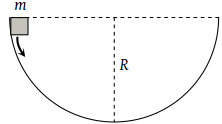A force F is applied on a body which moves with a velocity v in the direction of the force, then the power will be
1.
2. Fv
3.
4. F/v
Potential energy \((U)\) related to coordinates is given by; \(U=3(x+y).\) Work done by the conservative force when the particle is going from \((0,0), (2,3)\) is:
1. \(15~\text J\)
2. \(-15\text{ J}\)
3. \(12\text{ J}\)
4. \(10\text{ J}\)
A mass m slips along the wall of a semispherical surface of radius R. The velocity at the bottom of the surface is [ MP PMT 1993]

1.
2.
3.
4.
Three different objects of mass and m3 are allowed to fall from rest and from the same point ‘O’ along three different frictionless paths. The speeds of the three objects, on reaching the ground, will be in the ratio of:
| 1. | 2. | ||
| 3. | 1 : 1 : 1 | 4. |
When a body moves with a constant speed along a circle
1. No work is done on it
2. No acceleration is produced in the body
3. No force acts on the body
4. Its velocity remains constant
A sphere of mass m is tied to end of a string of length l and rotated through the other end along a horizontal circular path with speed v. The work done by centripetal force in full horizontal circle is
1. 0
2.
3.
4.
In a circus stuntman rides a motorbike in a circular track of radius R in the vertical plane. The minimum speed at highest point of track will be
1.
2. 2gR
3.
4.
A ball is suspended by a thread of length l. What minimum horizontal velocity has to be imparted to the ball for it to reach the height of the suspension:
1. gl
2. 2 gl
3.
4.
A body of mass m hangs at one end of a string of length l, the other end of which is fixed. It is given a horizontal velocity so that the string would just reach where it makes an angle of 60° with the vertical. The tension in the string at mean position is
1. 2 mg
2. mg
3. 3 mg
4.
As per the given figure to complete the circular loop, what should be the radius of the loop?
1. 4 m
2. 3 m
3. 2.5 m
4. 2 m







